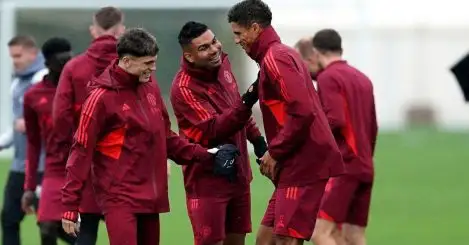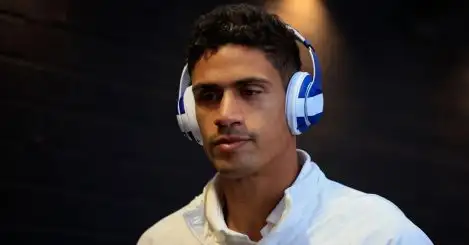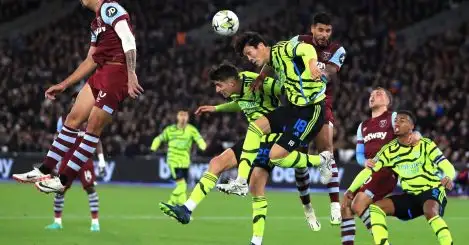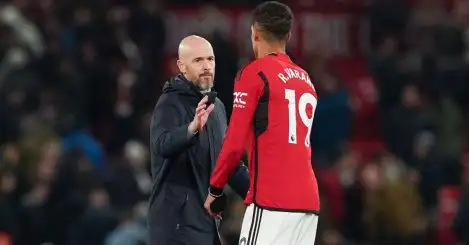Man Utd star hits out at FA over ‘damaging’ new guidelines despite player feedback

Manchester United defender Raphael Varane has hit out at the “damaging” new guidelines on added time and conduct for this season’s Premier League and asked why players’ opinions are not being heard.
Competitions around the world have been instructed to more accurately calculate time lost to stoppages this season, including goal celebrations and VAR checks.
Arsenal equalised in the 11th of 13 added minutes at the end of Sunday’s Community Shield against Manchester City and went on to win on penalties.
The game’s lawmakers, the International Football Association Board, said in March that the approach to calculating added time was “positively received” when it was first tested at the men’s World Cup in Qatar last year and would be rolled out worldwide.
However, Varane says the changes have been brought in “despite our previous feedback” and are placing too much pressure on players.
He tweeted on Monday morning: “We had a meeting last week with the FA. They recommended from the referees new decisions and rules.
READ MORE: Reasons for optimism at every Premier League club and a Man Utd conundrum…
“From the managers and players, we have shared our concerns for many years now that there are too many games, the schedule is overcrowded, and it’s at a dangerous level for players’ physical and mental well-being.
“Despite our previous feedbacks, they have now recommended for next season: longer games, more intensity, and less emotions to be shown by players. We just want to be in good condition on the pitch to give 100 per cent to our club and fans. Why are our opinions not being heard?”
We had a meeting last week with the FA. They recommended from the referees new decisions and rules.
From the managers and players, we have shared our concerns for many years now that there are too many games, the schedule is overcrowded, and it’s at a dangerous level for…
— Raphaël Varane (@raphaelvarane) August 7, 2023
Varane retired from international football at the age of 29 earlier this year, likening the slog of the top-level game to being in a washing machine.
The new guidelines on added time have been introduced to tackle timewasting and increase effective playing time.
FIFA found 10 minutes and 11 seconds of added time were played on average in Qatar, an increase on the average for the previous World Cup finals in Russia, but also found effective playing time was up in Qatar by more than four minutes compared to Russia.
However, the impact of the extra added time on players over a sustained period has already been highlighted by their global union FIFPRO, which reported earlier this year that the changes would amount to the equivalent of up to three extra games per season for players with the highest existing workloads.
A spokesperson for the English players’ union, the Professional Footballers’ Association, said: “Maheta (Molango, PFA CEO) has personally met and been speaking with a significant number of senior players and managers in the past few weeks, including Raphael (Varane), and there are concerns about how the new additional time rules will play out over a long season of league and cup games, as opposed to short tournaments.
“Across what is now essentially a year-long football season, players are already thinking of these additional minutes in terms of extra games being played. It also comes at a time when players are pushing back against what is, increasingly, a completely unsustainable football calendar.”
Varane added: “As a player I feel very privileged to do the job I love every day but I feel these changes are damaging our game.
“We want to be at our maximum level, the best we can be and put on amazing performances for fans to celebrate every week.
“I believe it is important that we, players and managers, highlight these important issues as we want to protect the game we love and give the fans our best.”
Varane’s remark about “less emotions to be shown by players” appeared to be a reference to a new code of conduct designed to improve the behaviour of players, coaches and fans at all levels of the English game announced last week.
It has been launched with the support of all of the football authorities, with the Professional Footballers’ Association understood to have helped shape the new guidance.
Referees will be expected to take a more consistent and tough line when players surround them to challenge decisions. Officials should issue at least a yellow card where two or more players confront them.
Players and coaches who seriously or repeatedly abuse referees could face increased financial penalties from the Football Association, while a tougher line is set to be taken against fans involved in football tragedy abuse.





